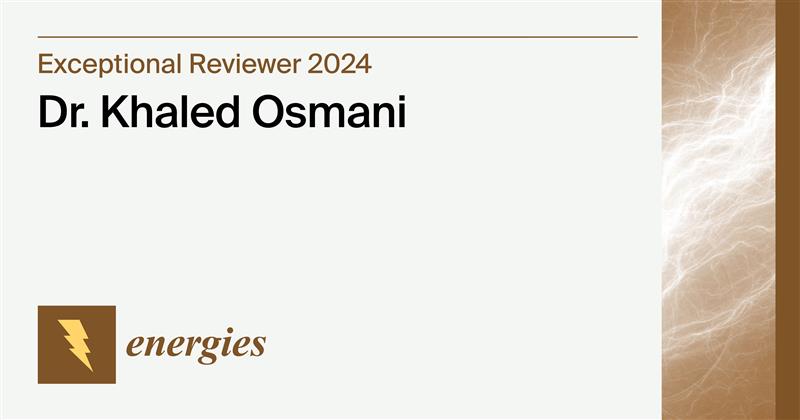
Interview with Dr. Khaled Osmani—Energies Exceptional Reviewer 2024
Join us as we engage with our Energies Exceptional Reviewer 2024, Dr. Khaled Osmani, to discuss his scholarly insights and journey as a reviewer for Energies (ISSN: 1996-1073).
Name: Dr. Khaled Osmani
Affiliation: Department of Electrical Engineering, Helmut Schmidt University, 22043 Hamburg, Germany
Interests: electrical; energy; renewable energy; batteries; algorithms; power electronics; solar PV; MPPT; smart grids
The following is an interview with Dr. Khaled Osmani:
1. Could you give a brief introduction to yourself to the readers?
My name is Khaled Alosmani and I obtained my Ph.D. in 2023 from the University of Angers, France. Currently, I am a postdoc at Helmut Schmidt University, Germany, and I am researching innovative electrical current sensors used in drones.
2. How was your experience of reviewing for Energies?
The platform is very user-friendly and straightforward, and it offers many options to reviewers in order to make a critical assessment of a paper. The communication from the journal representatives is also friendly, timely, and understanding. As a reviewer, I make detailed observations in order to ensure the scientific integrity of the journal.
3. Do you have any suggestions for improving our review process?
The journal can improve the way it targets reviewers in order to make sure they are always working on the scope of the paper. Some review reports are sometimes too simple, and they should be improved in order to maintain the scientific quality of the journal.
4. In your opinion, which research topics will be of particular interest to the research community in the coming years?
Renewable energy and AI. These topics can be mixed, and we can integrate many types of renewable energy so that we can have a 100% renewable platform. The goal is to integrate five–six types in order to obtain zero carbon emissions.
5. What motivated you to participate actively in the peer review process, and what do you find most rewarding about it?
I first published a paper with MDPI in 2022, and the review process was strict; I had to carefully revise the paper. This experience encouraged me to participate in the review process in order to show that it is serious and papers can be rejected. I am dedicated to scientific integrity and the reputation of MDPI journals.
6. How do you manage your time and balance your responsibilities as a researcher and a reviewer?
In my review work, I am fast, precise, and detailed. I criticize papers like I would with my work. I learn from reviewing and it is not a matter of time management, since it is instantaneous and spontaneous.
7. What advice would you give to early career researchers who are starting to participate in peer reviews?
Do not rush; nobody is able to obtain a top scientist level in just a couple of years. We need patience; review reports also need patience and time. Slow down, be modest and humble; we cannot attack authors just because we do not agree with their comments. We need to be objective. Every reviewer has only one opinion. It does not mean that we are 100% correct. Time, humbleness, objectivity, and scientific integrity are all important. We need to take time because, otherwise, when we make fast decisions, others will make fast decisions on our own work and things can escalate.
8. How do you see the role of reviewers evolving with the advancements in artificial intelligence and automated tools in research publishing?
Whatever type of artificial intelligence we have, they are not able to criticize a scientific paper as a human being. A scholar can provide more in-depth comments. AI models cannot provide valid and detailed points.
